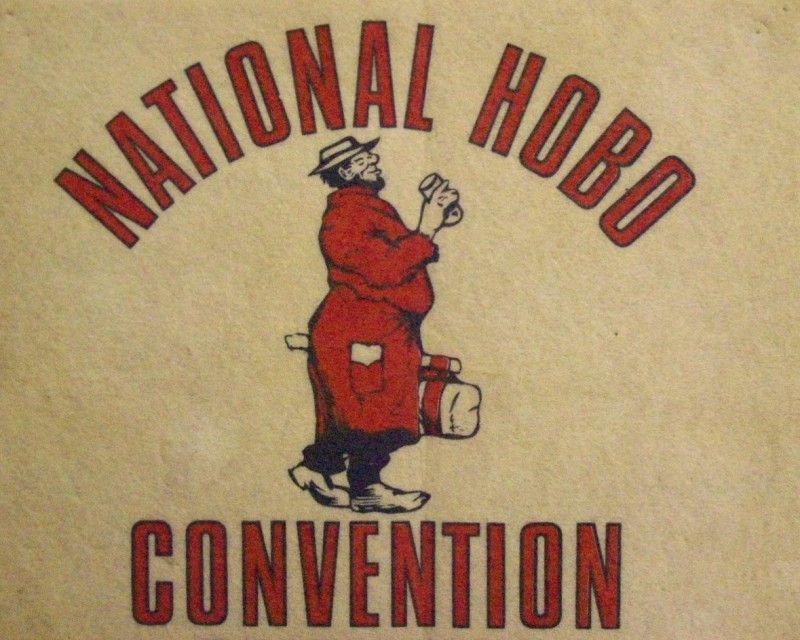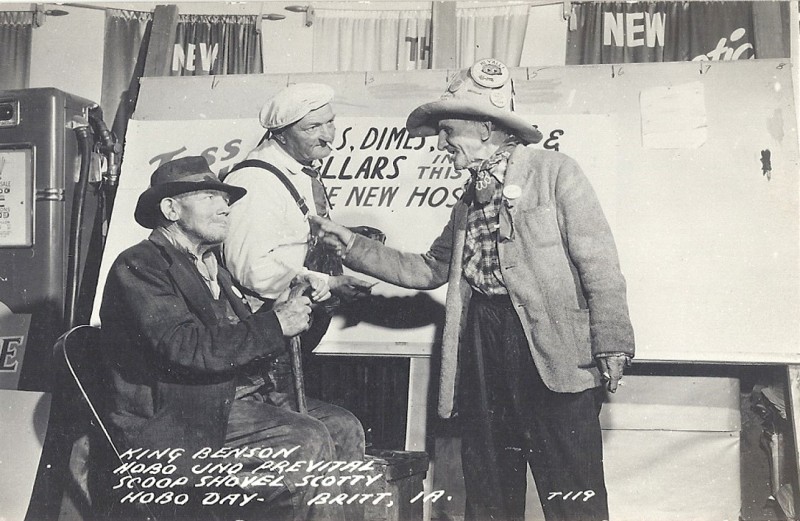Encyclopedia Dubuque
"Encyclopedia Dubuque is the online authority for all things Dubuque, written by the people who know the city best.”
Marshall Cohen—researcher and producer, CNN
Affiliated with the Local History Network of the State Historical Society of Iowa, and the Iowa Museum Association.
HOBOS
HOBOS. Hobos were nomadic Americans who began appearing in the 1800s and continued into the 21st century. In 1910 an article in the Telegraph-Herald referred to them as "members of the United Order of the Sons of Rest" and "Weary Willies." (1) In 1915 the paper referred to them as members of the "Amalgamated Order of Non-Workers." (2) Rejecting these labels," hobos took work wherever they could and never spent too long in one place. The Hobo Convention website defines a hobo as this: “hobo wanders and works, a tramp wanders and dreams and a bum neither wanders nor works.” (3)
Hobos took advantage of the railroad system stretching across state and country, and used them as a way to look for work. As they rested or changed trains, hobos gathered together in areas local residents referred to as "jungles." It was then the job of the police department to run them off.
In May, 1915 eighty-five hobos plus an estimated dozen found in railroad cars were marched out of town by the chief of police, a detective and two officers. Moving along the tracks of the ILLINOIS CENTRAL RAILROAD for nine miles, the hobos were told to keep moving and not come back. After watching the procession for thirty minutes, the police returned to the city. The officers reported that Dubuque seemed to receive a great many hobos with more replacing those arrested or run-out-of-town. Little robbery due to hobos were reported. The newspaper editorialized in the article that "a rock pile would likely solve the problem." (4)
In the mid-1800s, sixty-three hobos formed a tourist union to avoid prosecution for vagrancy. Called Tourist Union #63, they decided that every year a convention would be held for the members to renew friendships, collect dues, sign new members, and honor a king and queen hobo. Kings and Queens were elected to elevate the hobo in the eyes of the public. Each year the gathering hobos honor those they think are the most deserving of their union and those people become king and queen until the next convention. It was at one of these conventions, held in St. Louis in 1889 that the Code of the Rail was drawn up. (5)
An ethical code was created by Tourist Union #63 during its 1889 National Hobo Convention in St. Louis, Missouri.[16] This code was voted upon as a concrete set of laws to govern the Nationwide Hobo Body; it reads this way:
1. Decide your own life, don't let another person run
or rule you.
2. When in town, always respect the local law and officials,
and try to be a gentleman at all times.
3. Don't take advantage of someone who is in a vulnerable
situation, locals or other hobos.
4. Always try to find work, even if temporary, and
always seek out jobs nobody wants. By doing so you
not only help a business along, but ensure employment
should you return to that town again.
5. When no employment is available, make your own work
by using your added talents at crafts.
6. Do not allow yourself to become a stupid drunk and
set a bad example for locals' treatment of other hobos.
7. When jungling in town, respect handouts, do not wear
them out, another hobo will be coming along who will
need them as badly,if not worse than you.
8. Always respect nature, do not leave garbage where
you are jungling.
9. If in a community jungle, always pitch in and help.
10. Try to stay clean, and boil up wherever possible.
11. When traveling, ride your train respectfully, take no
personal chances, cause no problems with the operating
crew or host railroad, act like an extra crew member.
12. Do not cause problems in a train yard, another hobo will
be coming along who will need passage through that yard.
13. Do not allow other hobos to molest children, expose all
molesters to authorities, they are the worst garbage to
infest any society.
14. Help all runaway children, and try to induce them to
return home.
15. Help your fellow hobos whenever and wherever needed, you
may need their help someday.
16. If present at a hobo court and you have testimony, give it.
Whether for or against the accused, your voice counts! (6)
In the 1900s, the citizens of Britt, Iowa convinced the Tourist Union #63 to host its National Hobo Convention in their town. Over 100 years later, the town of Britt is still known as the home for the convention, as well as a huge collection of Hobo artifacts. Every hobo still tries to make it to the annual Hobo convention, which takes place in Britt, Iowa. (7)
---
Source:
1. "Hobos Begin Annual Move," Telegraph-Herald, March 10, 1910, p. 10
2. "Police Break Up Hobo Convention," Telegraph-Herald, May 23, 1915, p. 14
3. "Hobo Culture," Online: https://uni.edu/carrchl/wp/allaboard/hobo-culture/
4. "Police Break Up..."
5. Ibid.
6. "Hobo," Wikipedia, Online: https://en.wikipedia.org/wiki/Hobo
7. "Police Break Up..."



